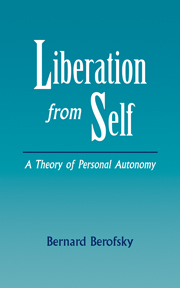Book contents
- Frontmatter
- Contents
- Liberation from self
- 1 Introduction
- 2 Freedom and autonomy
- 3 Freedom of action
- 4 Agent freedom
- 5 Values and the self
- 6 Autonomy and rationality
- 7 Rationality, values, and integrity
- 8 The liberation theory of autonomy: Objectivity
- 9 The liberation theory of autonomy: The place of self
- 10 The value of autonomy
- Notes
- Bibliography
- Index
2 - Freedom and autonomy
Published online by Cambridge University Press: 16 September 2009
- Frontmatter
- Contents
- Liberation from self
- 1 Introduction
- 2 Freedom and autonomy
- 3 Freedom of action
- 4 Agent freedom
- 5 Values and the self
- 6 Autonomy and rationality
- 7 Rationality, values, and integrity
- 8 The liberation theory of autonomy: Objectivity
- 9 The liberation theory of autonomy: The place of self
- 10 The value of autonomy
- Notes
- Bibliography
- Index
Summary
This book is about autonomy. In the next three chapters a conception of freedom will be defended according to which autonomy is different from, but dependent upon, freedom. I want first to summarize, without argument or elaboration, the results about freedom so that I can contrast freedom with autonomy and thereby introduce the basic ideas about the latter which guide my thinking.
Positive freedom and autonomy
Positive freedom is comprised of a set of personal traits which are essential or highly useful to the satisfaction of a wide range of activities and decisions, both short- and long-term. It encompasses relevant knowledge, including self-knowledge, and a variety of intellectual and physical competences. (Among intellectual competences, I include capacities for memory, perception, calculation, reasoning, information processing, and the elimination of irrational and inconsistent belief sets.) A free agent is free of debilitating physical infirmities, addictions, and severe stress. (I count a certain level of emotional health as a separate condition of autonomy. The details are presented in Chapters 8 and 9. Personal integrity, including the absence of conditions like severe psychosis, multiple personality, and split brains, is regarded as a condition of positive freedom rather than one of its elements.) Free agents may or may not possess the freedom to do and decide to do what is (deeply) important to them.
- Type
- Chapter
- Information
- Liberation from SelfA Theory of Personal Autonomy, pp. 16 - 33Publisher: Cambridge University PressPrint publication year: 1995



